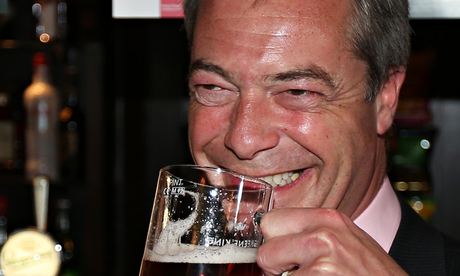The fox, said Nigel Farage, is in the Westminster henhouse. The canary may even be asphyxiated in the coal mine. Whatever the chosen metaphor, four-party politics has arrived in Britain, and the only question is whether it will ever go away.
Labour can fairly claim that as Friday dragged on, it did better than the first local election results had indicated on Thursday night. But Farage can also reasonably say that Ukip now has an imprint in local government under a first-past-the-post system. And the Ukip leader is promising that the imprint will deepen, and provide the basis to win constituency seats in a general election.
Thursday's elections, concentrated in Labour areas, have also confirmed, if confirmation was needed, that Ukip can damage Labour as much as it can the Conservatives, meaning both main parties need to throw out the old methods to project swings and to forecast the marginal seats they can gain.
In Rotherham, a Labour heartland, Ukip came first in 10 and second in 11 of the 21 seats it fought. But in such cases the Ukip insurgency does not yet look powerful enough to threaten Labour seats in 2015.
More worryingly, in some target seats in the north-west and the West Midlands, a strong Ukip performance has meant Labour has not made the gains for which it had hoped, for instance in Birmingham, Dudley and Walsall. "Worcester man" has also not gone Labour.
But that is not the whole picture. The most obvious exception seems to be London. The capital has its own house prices, a multicultural population and now, almost, its own political cycle.
The city that spawned the recession seems to be the part of the country least hit by its consequences, and most willing to back Labour. Even in Barking, Labour held every seat. There were many gains, too: an impressive achievement that reflects the strength of the activist base in the capital where its "get out the vote" operation had some successes. In Hornsey and Wood Green, the party is 1,500 strong.
One Labour strategist, speaking as the second wave of results emerged, said: "I would rather be where we are this morning than where [Conservative party campaign consultant] Lynton Crosby is. There is a massive wave sweeping over politics called four-party politics. But there is also a strong current to Labour. We think we will make over 250 gains."
Labour with growing credibility insisted it was winning in the marginals where it mattered and pointed to victories outside London, in Cambridge, Lincoln, Amber Valley, Ipswich, Peterborough and Carlisle.
But there is also an acknowledgement that it did not do as well as it hoped, with disappointment in Trafford.
By the time of the general election next year, senior Labour strategists accept the Ukip vote will not shrink back to the 3% it polled in the 2010 general election, but still believe the bulk of the Ukip damage then will be inflicted on the Conservatives.
Still, there will be an inquest into the Labour campaign, and why it has been as much the victim of the anti-politics mood as the governing parties.
Some Labour MPs, such as John Spellar, John Healey, Peter Hain and John Mann, have long been arguing for the party to go on the front foot against Ukip, exposing them as modern-day Thatcherites bent on flat taxes and NHS privatisation. It has been said that Douglas Alexander, the party's chief election strategist, rejected pleas, including from his MEPs, to put an attack on Ukip centre-stage.
But he did sanction market-tested literature attacking Ukip, and has a clear analysis of what is driving Ukip support. He has argued that Ukip is not fuelled by dislike of Europe, but by a hatred of the political class. In some alienated communities, there is a sense that people have been ignored by Westminster, and simply cannot see their place in the future. Alexander has argued this predates George Osborne's 2010 budget, and even the financial crash in 2007.
Coming from Scotland, Alexander is unlikely to underestimate the importance of four-party politics.
Miliband also insists he understands the discontent that led people to vote Ukip, and his choice is to patiently offer practical policies to address the anger with politics. It is the approach Barack Obama took with the Tea Party in the US. It means no name-calling, but instead addressing the causes of the discontent.
Many MPs close to their working class communities bluntly disagree with this analysis and think it is time to do more to call Ukip out, rather than spending time attacking the self-immolating Liberal Democrats. They argue that Miliband put out a lot of policy in this campaign designed to appeal to potential Ukip supporters, but it was drowned out by immigration, welfare and Farage.
But the doorstep issue of Miliband himself does exist. Parts of the campaign malfunctioned: if you are planning to take Swindon council, you need to know the name of the Labour leader on said council; if you are campaigning on the cost of living, you need to know the cost of living. Miliband struggled to credibly estimate his weekly shopping bill, reckoning it at very modest£70 to £80 a week.
But Labour says the campaign was deliberately intensive and a dry run for the 2015 general election. Better to mess up now and fine tune, rather than mess up in 2015, they argue.
Labour insists Ukip supporters are more likely to be won over by the Miliband message in the next year, than by David Cameron's claims that the economy has recovered. It means the test for the Alexander team now is how far they can deflate the Ukip bubble. It hopes these Labour sympathisers will recoil at the thought of a second term for Cameron, and Ukip's appeal to older, white, working-class men will wane.
Cameron, by contrast, thinks he has two decisive weapons – a rapidly improving economy, and Miliband. The next year will reveal the truth.










